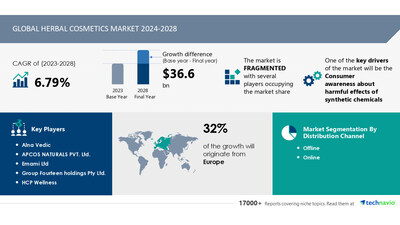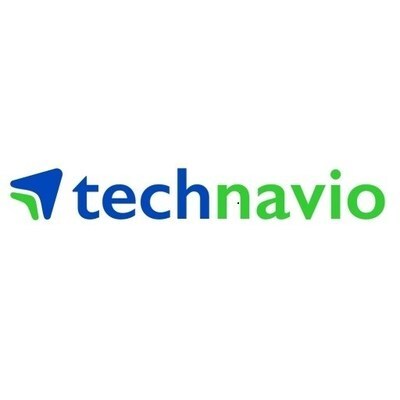Herbal Cosmetics Market to Grow by USD 36.6 Billion (2024-2028), Boosted by Consumer Awareness of Synthetic Chemicals, AI Driving Market Transformation - Technavio
PR Newswire
NEW YORK, Sept. 16, 2024
NEW YORK, Sept. 16, 2024 /PRNewswire/ -- Report with the AI impact on market trends- The global herbal cosmetics market size is estimated to grow by USD 36.6 billion from 2024-2028, according to Technavio. The market is estimated to grow at a CAGR of 6.79% during the forecast period. Consumer awareness about harmful effects of synthetic chemicals is driving market growth, with a trend towards increasing preference for online shopping. However, high cost of herbal cosmetic products poses a challenge. Key market players include Alna Vedic, APCOS NATURALS PVT. Ltd., Emami Ltd, Group Fourteen holdings Pty Ltd., HCP Wellness, Herbline, Himalaya Holdings Ltd., Jovees Herbal Care India Ltd., Khadi Natural, LOreal SA, Lotus Herbals Pvt. Ltd., MyChelle Dermaceuticals LLC, Nykaa Fashion Pvt. Ltd., Patanjali Ayurved Ltd., RDM Care India Pvt. Ltd., The Hain Celestial Group Inc., The Procter and Gamble Co., Vaadi Herbals Pvt. Ltd., WALA Stiftung, Weleda Group, and Yves Rocher Amerique du Nord Inc..
Key insights into market evolution with AI-powered analysis. Explore trends, segmentation, and growth drivers- View the snapshot of this report
Herbal Cosmetics Market Scope | |
Report Coverage | Details |
Base year | 2023 |
Historic period | 2018 - 2022 |
Forecast period | 2024-2028 |
Growth momentum & CAGR | Accelerate at a CAGR of 6.79% |
Market growth 2024-2028 | USD 36.6 billion |
Market structure | Fragmented |
YoY growth 2022-2023 (%) | 6.27 |
Regional analysis | APAC, Europe, North America, South America, and Middle East and Africa |
Performing market contribution | Europe at 32% |
Key countries | China, US, Germany, France, and South Korea |
Key companies profiled | Alna Vedic, APCOS NATURALS PVT. Ltd., Emami Ltd, Group Fourteen holdings Pty Ltd., HCP Wellness, Herbline, Himalaya Global Holdings Ltd., Jovees Herbal Care India Ltd., Khadi Natural, LOreal SA, Lotus Herbals Pvt. Ltd., MyChelle Dermaceuticals LLC, Nykaa Fashion Pvt. Ltd., Patanjali Ayurved Ltd., RDM Care India Pvt. Ltd., The Hain Celestial Group Inc., The Procter and Gamble Co., Vaadi Herbals Pvt. Ltd., WALA Stiftung, Weleda Group, and Yves Rocher Amerique du Nord Inc. |
Market Driver
Online distribution channels, including e-retailers, company portals, and third-party marketplaces, are key drivers in the growing popularity of herbal cosmetics sales. Major retailers like eBay and Amazon offer a vast selection of brands and products, enabling consumers to compare and purchase herbal cosmetics conveniently. The rise of smartphones and the increasing number of online shopping portals have expanded the reach of vendors in the global herbal cosmetics market. Brands like Alba Botanica on Amazon and Himalaya's own web portal are examples of this trend. These factors are expected to boost the growth of the herbal cosmetics market during the forecast period.
The herbal cosmetics market is on the rise, with a growing trend towards traditional remedies and organic skincare solutions. Middle-class consumers are increasingly seeking herbal beauty products for skincare health, using essential oils, face masks, and body scrubs. Botanical heritage is a key selling point, with quality ingredients sourced from local suppliers. Luxury and sophistication meet sustainability initiatives, as beauty companies offer herbal compounds for acne, hair issues, UV rays protection, and pollution defense. Social media and beauty blogs fuel demand, with consumers shunning chemical-based alternatives. Ayurvedic products, skin tone concerns, and animal cruelty-free practices are also important factors. Exports of herbal cosmetics are increasing, making these products accessible to a global audience. Packaging remains a focus, with eco-friendly options a priority.
Request Sample of our comprehensive report now to stay ahead in the AI-driven market evolution!
Market Challenges
- Herbal cosmetic products are created using natural plant extracts, essential oils, and other organic elements, devoid of synthetic ingredients or chemicals. These premium and luxury offerings, however, are often inaccessible to the lower and middle classes due to their elevated prices. Production costs for herbal cosmetics are higher than conventional alternatives due to the expensive raw materials and labor-intensive manufacturing process. Regulations, such as Health Canada's prohibition of hazardous ingredients and the EU's REACH regulation, necessitate the use of high-quality raw materials and rigorous registration processes, contributing to the increased costs. Consequently, manufacturers are compelled to set high prices, potentially hindering the expansion of the global herbal cosmetics market.
- The herbal cosmetics market is experiencing significant growth due to increasing consumer demand for natural and organic products. Key herbs like Lavender and Chamomile flowers are popular choices, with Ayurvedic practices influencing the trend. The ecommerce industry plays a crucial role in market expansion, allowing easy access to herbal formulations through online platforms and specialty stores. However, challenges such as synthetic chemicals, regulations, and compliance, shelf life, product quality, and efficacy remain. Influencers, celebrities, and social media platforms are driving awareness and demand for cruelty-free, sustainable, and natural ingredients. Market dynamics include consumer preferences for wellness, skincare routines, and tailored solutions. Climate change, environmental degradation, geopolitical instability, and production costs are pressing issues requiring standardized regulations and quality control measures. The market includes skincare products like moisturizers, cleansers, and serums, catering to various age groups, skin types, and sensitivities. Cultural heritage and a multicultural population add to the market's diversity, emphasizing holistic wellness and simplicity.
Discover how AI is revolutionizing market trends- Get your access now!
Segment Overview
This herbal cosmetics market report extensively covers market segmentation by
- Distribution Channel
- 1.1 Offline
- 1.2 Online
- Product
- 2.1 Skin care
- 2.2 Hair care
- 2.3 Body care
- Geography
- 3.1 APAC
- 3.2 Europe
- 3.3 North America
- 3.4 South America
- 3.5 Middle East and Africa
1.1 Offline- The herbal cosmetics market is growing steadily due to increasing consumer awareness and preference for natural and organic personal care products. Brands are focusing on using herbs and botanical extracts in their formulations to cater to this demand. Herbal cosmetics offer several benefits such as being gentle on the skin, free from harsh chemicals, and eco-friendly. Companies are investing in research and development to create innovative herbal cosmetic solutions that meet consumer expectations. The market is expected to continue its growth trajectory in the coming years.
Download a Sample of our comprehensive report today to discover how AI-driven innovations are reshaping competitive dynamics
Research Analysis
The herbal cosmetics market is experiencing a significant growth in demand as consumers increasingly seek natural and organic alternatives to traditional beauty products. Herbal beauty products, derived from various plants and herbs, offer numerous benefits for the skin, hair, and overall health. These products address common issues such as acne, hair loss, UV damage, and pollution, using herbal compounds like lavender, chamomile flowers, and Ayurvedic formulations. The ecommerce industry plays a crucial role in the distribution of these products, with online platforms and specialty stores gaining popularity. Social media and beauty blogs have become powerful tools for marketing herbal cosmetics, with influencers and celebrities endorsing these natural solutions. Animal cruelty-free and sustainable production are key considerations for many consumers, making herbal cosmetics an attractive alternative to beauty products containing synthetic chemicals.
Market Research Overview
The herbal cosmetics market is witnessing a significant growth in demand as consumers increasingly seek natural and organic beauty solutions. Herbal beauty products, derived from herbal compounds and natural ingredients such as lavender, chamomile flowers, and Ayurvedic formulations, cater to various skin concerns including acne, aging, sensitivity, and UV ray damage. The market is influenced by factors like social media, beauty blogs, animal cruelty concerns, and consumer preferences for cruelty-free and sustainable products. Key issues like skin tone, pollution, and climate change drive the demand for herbal skincare solutions. Beauty companies are investing in research and development to create herbal formulations for cleansers, moisturizers, serums, and other skincare products. Retail channels, online platforms, specialty stores, and ecommerce industry are major retail outlets for these products. The market dynamics are shaped by factors like product quality, efficacy, regulations, and compliance. Natural ingredients like essential oils, face masks, body scrubs, and botanical heritage are at the forefront of this trend. Sustainability initiatives, luxury and sophistication, and standardized regulations are also key considerations. The market is expected to grow further as consumers prioritize skincare health, holistic wellness, and cultural heritage in their skincare routines.
Table of Contents:
1 Executive Summary
2 Market Landscape
3 Market Sizing
4 Historic Market Size
5 Five Forces Analysis
6 Market Segmentation
- Distribution Channel
- Offline
- Online
- Product
- Skin Care
- Hair Care
- Body Care
- Geography
- APAC
- Europe
- North America
- South America
- Middle East And Africa
7 Customer Landscape
8 Geographic Landscape
9 Drivers, Challenges, and Trends
10 Company Landscape
11 Company Analysis
12 Appendix
About Technavio
Technavio is a leading global technology research and advisory company. Their research and analysis focuses on emerging market trends and provides actionable insights to help businesses identify market opportunities and develop effective strategies to optimize their market positions.
With over 500 specialized analysts, Technavio's report library consists of more than 17,000 reports and counting, covering 800 technologies, spanning across 50 countries. Their client base consists of enterprises of all sizes, including more than 100 Fortune 500 companies. This growing client base relies on Technavio's comprehensive coverage, extensive research, and actionable market insights to identify opportunities in existing and potential markets and assess their competitive positions within changing market scenarios.
Contacts
Technavio Research
Jesse Maida
Media & Marketing Executive
US: +1 844 364 1100
UK: +44 203 893 3200
Email: media@technavio.com
Website: www.technavio.com/
![]() View original content to download multimedia:https://www.prnewswire.com/news-releases/herbal-cosmetics-market-to-grow-by-usd-36-6-billion-2024-2028-boosted-by-consumer-awareness-of-synthetic-chemicals-ai-driving-market-transformation---technavio-302247716.html
View original content to download multimedia:https://www.prnewswire.com/news-releases/herbal-cosmetics-market-to-grow-by-usd-36-6-billion-2024-2028-boosted-by-consumer-awareness-of-synthetic-chemicals-ai-driving-market-transformation---technavio-302247716.html
SOURCE Technavio



